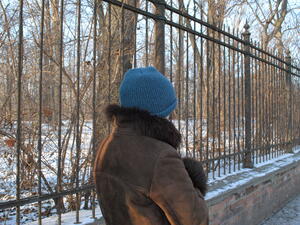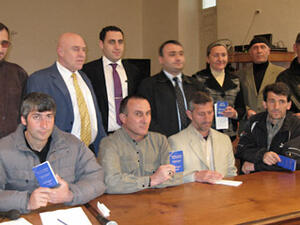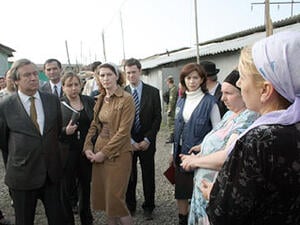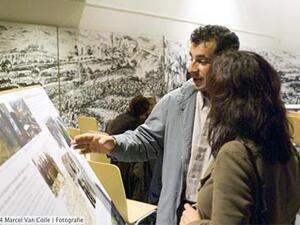Helping Chechens back on their feet in Kazakhstan
Helping Chechens back on their feet in Kazakhstan
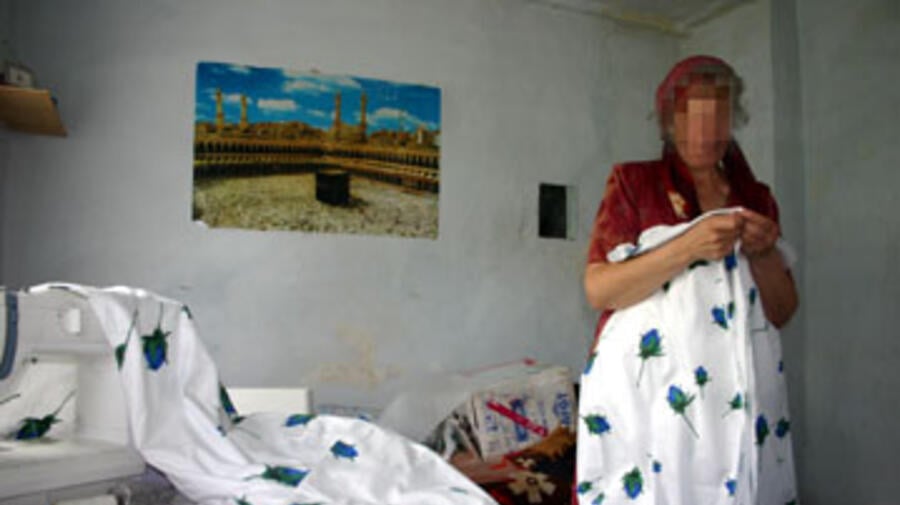
Gazuyeva at work on a sewing machine provided by UNHCR. She lives in fear of revealing her Chechen identity (face pixellated to protect identity).
ALMATY, Kazakhstan, August 16 (UNHCR) - For a woman living with next to nothing, Ayshat Gazuyeva* has a lot to hide. Her rented house on the outskirts of Kazakhstan's former capital Almaty is bare, save for two small beds for her family of five. A poster of a grandiose palace taped up on the wall stands in stark contrast to the desolate room.
But from under her bed, Gazuyeva pulls out a box to unveil her prized possession - a sewing machine. "This is not a safe neighbourhood, people can just open the window and steal things. I'm afraid they'll take my machine," says the 47-year-old mother of three.
The sewing machine is not her only secret. "Everyone thinks I'm Russian. I tell no one I'm Chechen because of negative perceptions," she confides. "When my neighbour found out, she said we don't deserve to live on her land. Our children are not allowed to play together anymore."
Her family fled their native Grozny, capital of the Russian republic of Chechnya, after their home was bombed in 1999. After a year in neighbouring Ingushetia, they took a friend's advice and came to Almaty. Here, they were assisted by the Association of Cultural Development for Chechen and Ingush People (VAINAH), which gave them food in the beginning and now pays their rent.
Gazuyeva's husband does odd jobs in northern Kazakhstan, leaving her in Almaty to fend for herself and the children, all of whom have medical problems. "I use every opportunity to make money," says Gazuyeva. "When my friends give me old things like shoes, I sell them in the bazaar. Still, sometimes I don't have enough money for food."
In Kazakhstan, Chechens are not admitted to the asylum process. As citizens of Russia, they are subject to the terms of the Minsk agreement, which requires all citizens of the Commonwealth of Independent States to register with the Kazakh police to get a renewable temporary residence permit for up to 90 days each time. This permit grants them the same benefits as locals, such as access to education.
UNHCR works with VAINAH and the Kazakhstan International Bureau for Human Rights and Rule of Law to provide some 5,000 Chechens in Kazakhstan with legal and material assistance. Gazuyeva, for example, received her prized sewing machine last summer. "I make bed linen for 300 tenge (US$2.50) per set," she says, polishing her machine. "My eyesight is failing, so I'm teaching my daughter to help."
Fellow Chechen Abu Madayev has also benefited from a UNHCR grant. Like Gazuyeva, he fled bombings in Grozny and arrived in Almaty in 1999. He cannot find work because he lacks the proper documents.
"In the beginning, we had no food or money," says the 45-year-old. "Then UNHCR gave me funds to start a chicken farm. At first, I bought some defective hens, but after one year, I'm now an expert on what kind of hen is best for meat and eggs."
Today, he owns 181 hens and recently bought a second-hand bicycle to transport chicken feed. His next priority is to build a proper chicken coop: "Without a warm and safe place, they cannot lay eggs."
Madayev's family of four has settled in well. "When we first came, we were illiterate. Now we can read and write," he beams proudly. "My son's work is displayed on the wall of his school. He also plays soccer very well and got into summer camp for free. My daughter won a prize for her essay, 'My Kazakhstan'."
Relations with his neighbours are good, says Madayev. "They know I'm Chechen. I have no problems with my neighbours or the authorities because I'm not harming anyone," he says. "Even the local police come to ask if anyone's harassing me."
To him, Kazakhstan offers a safe haven from his hometown, where he says all houses and schools have been destroyed. "We're here because of the children. Even if we have any difficulties, we hope our children will have a better life."
Kazakhstan is a signatory to the 1951 Convention Relating to the Status of Refugees and its 1967 protocol. The government has yet to pass a national refugee law to define the norms for determining refugee status and the rights and obligations of asylum seekers and refugees. Currently, some 700 people - most of them Afghans - have been recognised as refugees in Kazakhstan.
* Not her real name
By Vivian Tan in Almaty, Kazakhstan

